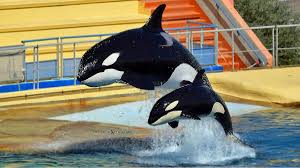Abandoned but Not Forgotten: The Tragic Fate of Whales and Dolphins at France’s Marineland
Pelagic ProblemsIn the quiet town of Antibes on the French Riviera, a storm is brewing not of weather, but of outrage. France’s largest marine park, Marineland, has officially shut down its dolphin and orca performances following the country’s 2021 ban on the use of cetaceans in live shows. But with the gates closed and the crowds gone, two orcas and 12 dolphins have been left behind in a state of uncertainty and activists are sounding the alarm.
The Forgotten Residents
Marineland’s final days were marked not by celebration or farewell tributes, but by the quiet abandonment of its most iconic residents: Wikie, a 22-year-old orca who made headlines in 2018 for mimicking human words, and her 12-year-old son Keijo. Alongside them, 12 dolphins remain confined in aging tanks, their futures as murky as the algae-filled water around them.
Recent drone footage captured by the animal rights group TideBreakers exposed disturbing visuals: crumbling infrastructure, cloudy, greenish water, and visibly deteriorating facilities. According to reports, park management confirmed that without urgent action, the whales may need to be euthanized due to the worsening environment (People, 2025).
A Legislative Win with Unintended Consequences
France’s decision to ban cetacean captivity for entertainment was hailed as a progressive milestone when it passed in 2021. But as critics now point out, the law moved faster than the country’s preparations to provide safe alternatives for the animals affected. For Wikie and Keijo, that means their former home is no longer viable but no new home has been approved.
Despite several attempts to relocate the whales to facilities in Japan and Spain, no suitable arrangements have materialized. One promising option—The Whale Sanctuary Project in Nova Scotia—was rejected by French authorities over concerns about the risks of a long-distance move (World Animal Protection, 2025).
What Happens Next?
Marine experts and activists argue that time is running out. With the facility in disrepair and limited staff on-site, the animals' physical and mental well-being are rapidly deteriorating. Park officials, once resistant to outside intervention, are now urging the government to expedite a transfer that could save the animals’ lives.
Meanwhile, the international community watches with growing concern. How did we get to a place where a legislative victory for animals has led to potential euthanasia for some of them? It’s a question that underscores the importance of long-term planning in animal welfare legislation.
A Call to Action
This situation is more than a scandal. It’s a reflection of the moral and logistical challenges facing modern conservation efforts. If we are to move beyond captivity-based entertainment, we must be prepared to provide humane, sustainable solutions for the animals already caught in the system.
Until then, Wikie, Keijo, and their dolphin companions remain in limbo, victims of good intentions gone awry.
The fate of Wikie, Keijo, and the 12 dolphins is still undecided. But it doesn't have to end in tragedy. With international support and swift action, they could live out their remaining years in a natural sanctuary experiencing the ocean, not chlorinated tanks.
Animal rights victories must be paired with ethical, long-term solutions. Let this be a lesson and a call for coordinated, compassionate reform.
Because no animal should be abandoned for simply outliving their entertainment value.
https://www.youtube.com/watch?v=u7Wzbn8wGCs&t=38s
Works Cited
-
Miller, Paris Close. “2 Killer Whales and 12 Dolphins Left Behind at Abandoned Marine Park in France.” People, May 17, 2025. https://people.com/2-killer-whales-12-dolphins-left-behind-abandoned-marine-park-france-11735311
-
“Marineland’s Orcas Denied Sanctuary – Here’s Why That’s Not Good Enough.” World Animal Protection UK, May 2025. https://www.worldanimalprotection.org.uk/latest/blogs/marineland-orcas-sanctuary-denied
-
“Wikie the Orca Learns to Mimic Human Words.” BBC News, January 31, 2018. https://www.bbc.com/news/science-environment-42883427

